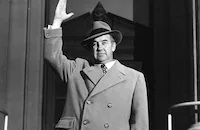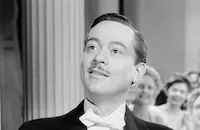Sealed Verdict
Cast & Crew
Lewis Allen
Ray Milland
Florence Marley
Broderick Crawford
John Hoyt
John Ridgely
Film Details
Technical Specs

Synopsis
On 20 June 1946, in Reschweiler, Germany, former New York attorney Major Robert Lawson, of the Judge Advocates General's Office, leads the prosecution in the trial of accused German war criminal General Otto Steigmann. Robert's chief witnesses, Slava Rodal and Maria Romanek, members of the undergound, claim that Steigmann gave the order for the Leemach Massacre, in which sixty war hostages were gunned down by Nazi troops. The defense's only witness is a beautiful French woman named Themis DeLisle, who testifies that Steigmann saved her father's life after he was accused of being part of the French underground. Seven weeks later, after Steigmann is sentenced to hang, Themis accuses Robert of sending an innocent man to his death. Robert's superior officer, General Kirkwood, congratulates him for a job well done and orders that the execution be done promptly to avoid a riot by the underground. Rodal then asks for two passes to the execution. All this leads Robert to suspect that Steigmann may have been set up as an example, and he begins to question the legality of the trial. Meanwhile, Robert's young American assistant, Private Clay Hockland, whose term in Europe is up, is shot in the street, and Clay's young German girl friend, Erika Wagner, is blamed. In the hospital, a dying Clay confesses to Robert that he shot himself, then reveals that Rodal threatened to kill Erika if Clay revealed the location of Steigmann's mother, which he learned through an anonymous tip to Robert's office. Ignoring Kirkwood's orders that Erika be tried for Clay's murder in order to appease the public, Robert, who has found Erika on the floor of her jail cell about to give birth, has her moved to a hospital. While conducting his own investigation, Robert locates Mrs. Emma Steigmann at the modest apartment of Hebrew teacher Jacob Meyersohn, who admits that he gave the anonymous tip to Clay. Despite the death of his own family at the hands of the Nazis, Meyersohn rescued Mrs. Steigmann because she had been a friend of his wife. Rodal had been protecting Emma's anonymity in exchange for money. Later, Rodal swears to Robert that Mrs. Steigmann still has her son's incriminating papers--a copy of the "Night and Fog" order, which gave Nazi officers permission to arrest any non-German at will, and a letter from Hitler congratulating him on the Leemach Massacre. Kirkwood, meanwhile, has arranged as a publicity stunt for Clay's Iowan parents--accompanied by gossip reporter Camilla Cameron--to be flown to his deathbed. By the time they arrive, however, Clay is dead, and Erika is in labor, dying. Armed with proof that Themis' father, who really was a member of the French underground, denounced her as a Nazi sympathizer, Kirkwood orders her arrest. Themis, meanwhile, has gone to give Mrs. Steigmann a message to destroy her son's "souvenirs," and for the first time, realizes that Steigmann is guilty. Mrs. Steigmann then refuses to let Themis leave, and in a rage, denounces the Jews in front of her appalled benefactor, Meyersohn. Mrs. Hockland, meanwhile, appeals to Robert to save her grandchild, and he gives Rodal two passes to Steigmann's execution in exchange for penicillin. Themis is then arrested after escaping from Mrs. Steigmann, and Robert rejects her new proof against Steigmann. Later, however, after Mrs. Hockland pledges to take her grandchild back to Iowa because the world needs more kindness, Robert has a change of heart and races to Meyersohn's. There he finds the burnt ashes of Steigmann's papers, and watches as Mrs. Steigmann proclaims that her son will be among the Nazi immortals. Although Themis has been ordered turned over to the French, Robert hides her in a deserted house and confesses his love. She finally explains that she pretended to be involved with Steigmann because if her father had known that an order from Steigmann had saved his life, he would not have accepted the help. She also tells Robert that the scar on Steigmann's face is fake. Robert promises to return to take Themis to Switzerland, and goes to Steigmann's cell. Moments before Steigmann's execution, Robert confronts him with the evidence of the papers, and tricks him into confessing that he is a Nazi. When Steigmann haughtily remarks that his name will be remembered along with Adolf Hitler's and Hermann Goering's, Robert slaps him, then cuts open the scar on his face to reveal two vials of poison, with which Steigmann was planning to kill himself. Steigmann is then led off to his execution, which Rodal and Maria witness. Robert picks up Themis and tells her that he must take her to Gribemont, but will be next to her in the courtroom, and long after.

Director

Lewis Allen
Cast

Ray Milland
Florence Marley

Broderick Crawford

John Hoyt

John Ridgely
Ludwig Donath
Norbert Schiller
Dan Tobin

Olive Blakeney
Marcel Journet
Paul Lees
James Bell

Elisabeth Risdon

Frank Conroy
Celia Lovsky
June Jeffery

Patricia Miller
Selmar Jackson
Charles Evans

Ann Doran
Dorothy Grainger

John Eldredge
Anna Hope

Douglas Spencer
Richard Glyn
Don Brown
William Meader
Len Hendry
Michael Brandon
Francis Morris
Bill Neff
Jerry James
Victor Romito
Holger Bendixen
Otto Reichow
Leo Schlesinger
Walter Rode
Paul Peter Szemere
David Willock

Carol Mathews
Hal Rand
Tad Van Brunt
Rae Patterson
John Wengraf
Fay Wall
Leslie Denison
Esther Zeitlin
Torben Meyer
Russell Arms
Eric Alden
Thomas Browne Henry
Frank Eldredge

Edward Van Sloan
Audrey Westphall
Crew
Claire Behnke
Frank Burgess
Dean Cole
Sam Comer
Gordon Dean
C. Kenneth Deland
Mary Kay Dodson
Hans Dreier
Farciot Edouart
Robert Fellows
Hugo Friedhofer
Alvin Ganzer
Gene Garvin
Gordon Jennings
Jonathan Latimer
Harry Lindgren
Alma Macrorie
John Meehan
Ray Moyer
Charles Sickler
Leo Tover
Wally Westmore

Film Details
Technical Specs

Quotes
Trivia
Notes
The working title of the film was Dossier. The opening credits of the film state that exterior scenes were photographed in Europe. The film opens with newsreel footage of Justice Robert Houghwout Jackson's address at the Nüremberg Tribunal of November 1945-October 1946. Jackson was the Chief Prosecutor for the United States at the Nüremberg Trials and was an Associate Justice of the U.S. Supreme Court. Technical advisor Gordon Dean served as Jackson's assistant during the Nüremberg trials. Sealed Verdict, CBS war correspondent Lionel Shapiro's first novel, was purchased by Paramount as a first draft manuscript. The novel became a best-seller after it was pubished by Doubleday in October 1947. According to an article by Virginia Wright in Los Angeles Daily News, producer Robert Fellows obtained more than 1,000 photographs of war crimes trials in Germany as source material for the film.
A pre-production news item in the Los Angeles Times announced Corinne Calvet as the picture's lead, but she was later replaced by Czech-born European star Florence Marly, who made her American screen debut in the film. Before shooting began, Paramount News announced that John Farrow would direct the picture, Howard DaSilva would appear as "Kinsella," and DeForest Kelley would appear as "Lieutenant Parker," but none of these men worked on the final film. Jeanne Deifel, a former "Miss Chicago," who changed her name to Carol Mathews also made her debut in the film. According Virginia Wright's article in the Los Angeles Daily News, exterior scenes were shot on location in Strasbourg, France.












